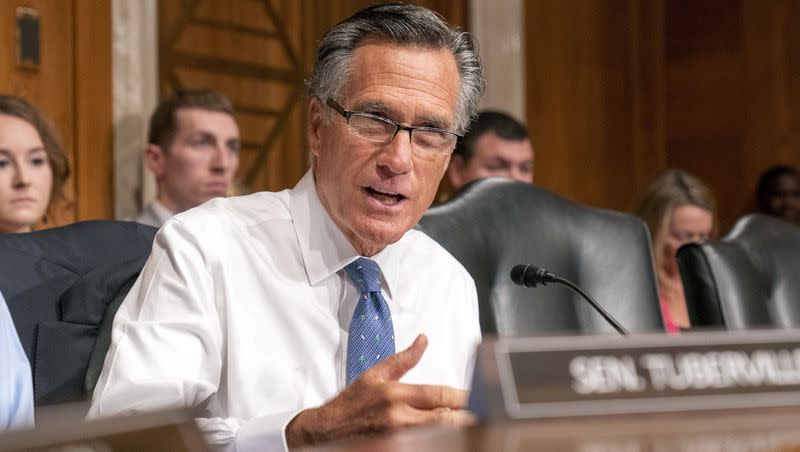Romney leads bipartisan bill for social media transparency

Sen. Mitt Romney reintroduced a bipartisan bill to create more transparency around the data that social media platforms gather while also allowing researchers access to the same.
Under the Platform Accountability and Transparency Act, researchers will be able to submit proposals to the National Science Foundation, an independent agency that supports research across the sciences, according to a press release from Romney’s office.
Social media platforms will be required to supply the data in case the pitch is approved.
“The threat social media has on the well-being of our young people and our national security is becoming more and more evident,” said Romney, a Republican.
“By increasing data access and transparency, this legislation will help parents, policymakers, and researchers better understand the impacts social media has on society, and allow Congress to craft policies that create a healthier online experience for children and all Americans,” the Utah senator said.
Related
Bill seeks to empower researchers
The bill will also require social media platforms to make certain data public on a regular basis. This would include comprehensive ad libraries, statistics on content moderation, real-time data on viral content and descriptions of a platform’s ranking and recommendation algorithms.
Meanwhile, researchers and the public will receive legal protections for collecting and analyzing the public-facing data.
The multipronged bill is cosponsored by Sen. Chris Coons, D-Del., Sen. Dr. Bill Cassidy, R-La., Sen. Amy Klobuchar, D-Minn., Sen. John Cornyn, R-Texas, and Sen. Richard Blumenthal, D-Conn.
“Social media platforms shape the information that billions of people across the globe consume, but we still know far too little about how they operate and the impact they have on each of us and our society,” said Coons, who originally introduced the bill in December 2021. The proposed legislation has undergone minor changes.
“Right now, Congress and the public have no way to verify whether or how safe these products really are,” he said.
The press release said that the Platform Accountability and Transparency Act has been endorsed by the Council for Responsible Social Media, a bipartisan group addressing the effects of social media on the public; Children and Screens: Institute of Digital Media and Child Development, an international nonprofit focused on keeping minors safe in the digital world; and Common Sense Media, a television and film ratings site geared towards children, among others.
Wider push for social media data access
The Senate and the House are also considering other bills that relate to researching social media platforms, like the Kids Online Safety Act, which seeks to allow researchers access to specific data to study any harmful effects in addition to protecting the information of minors.
In May, U.S. and European Union representatives attended the Trade and Technology Council in Sweden to discuss the role of the transatlantic partnership in the digital era.
In a joint statement, the two global powers said that online platforms should protect, empower and respect children, while independent researchers should be allowed to “investigate, analyze and report on how online platforms operate and how they affect individuals and society.”
Meanwhile, in Utah, Gov. Spencer Cox signed two bills that are intended to give parents more control over kids’ online use, as the Deseret News reported.
“Let me assure you that social media companies have all of your information, and that’s part of the problem. ... It’s crazy to me that we just think it’s suddenly OK to let 14-year-olds be at the mercy of these corporate behemoths when it comes to mining your data,” Cox said during a news conference in April.
Related

